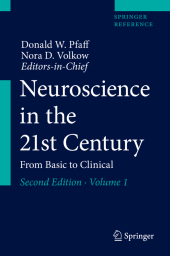 Neuerscheinungen 2016Stand: 2020-02-01 |
Schnellsuche
ISBN/Stichwort/Autor
|
Herderstra▀e 10
10625 Berlin
Tel.: 030 315 714 16
Fax 030 315 714 14
info@buchspektrum.de |

Donald W. Pfaff, Nora D. Volkow
(Beteiligte)
Neuroscience in the 21st Century, 5 Teile
From Basic to Clinical
Herausgegeben von Pfaff, Donald W.; Volkow, Nora D.
2. Aufl. 2016. lv, 4155 S. 281 SW-Abb., 1013 Farbabb. 235 mm
Verlag/Jahr: SPRINGER, BERLIN; SPRINGER NEW YORK; SPRINGER 2016
ISBN: 1-493-93473-2 (1493934732)
Neue ISBN: 978-1-493-93473-7 (9781493934737)
Preis und Lieferzeit: Bitte klicken
Edited and authored by a wealth of international experts in neuroscience and related disciplines, this key new resource aims to offer medical students and graduate researchers around the world a comprehensive introduction and overview of modern neuroscience.
Neuroscience research is certain to prove a vital element in combating mental illness in its various incarnations, a strategic battleground in the future of medicine, as the prevalence of mental disorders is becoming better understood each year. Hundreds of millions of people worldwide are affected by mental, behavioral, neurological and substance use disorders. The World Health Organization estimated in 2002 that 154 million people globally suffer from depression and 25 million people from schizophrenia; 91 million people are affected by alcohol use disorders and 15 million by drug use disorders. A more recent WHO report shows that 50 million people suffer from epilepsy and 24 million from Alzheimer┤s and other dementias.
16
ecause neuroscience takes the etiology of disease-the complex interplay between biological, psychological, and sociocultural factors-as its object of inquiry, it is increasingly valuable in understanding an array of medical conditions. A recent report by the United States┤ Surgeon General cites several such diseases: schizophrenia, bipolar disorder, early-onset depression, autism, attention deficit/ hyperactivity disorder, anorexia nervosa, and panic disorder, among many others. Not only is this volume a boon to those wishing to understand the future of neuroscience, it also aims to encourage the initiation of neuroscience programs in developing countries, featuring as it does an appendix full of advice on how to develop such programs. With broad coverage of both basic science and clinical issues, comprising around 150 chapters from a diversity of international authors and including complementary video components, Neuroscience in the 21 st Century in its second edition serves as a comprehensive resource to students and researchers alike.
Alzheimer┤s Disease.- Anxiety
Disorders.- Application of Genetic Techniques in Neural Tissue: Discovery.- Applicationof genetic techniques: Techniques for Manipulating Gene Expression.- Attention
Deficit Hyperactivity Disorder.- Attention Networks.- Axonal
Guidance: Making Connections.- Axonal Transport.- Blood Brain
Barrier.- Cable Modeling of Neurons and Modeling of Dendrites.- Cannabinoids
Pharmacology, Abuse and Addiction.- Cell Types within CNS:
Patterning.- Cerebellum.- Cerebral Microvessels.- Chemogenetics
(DREADDs).- Cognitive Neuroscience: Hippocampus.- Cortical Processing
of Visual Signals.- Declarative Associative Memory.- Default mode
networks.- Diffuse Signaling (NO, CO Gases) in the CNS.
Donald W. Pfaff, Ph.D, is a member of the National Academy of Sciences and a Fellow of the American Academy of Arts and Sciences. His laboratory has published more than 900 research papers and reviews. The author of several books on the brain and behavior, he received the 2005 Award for Excellence in Professional and Scholarly Publishing (medical science category) of the Association of American Publishers for his book, Brain Arousal and Information Theory.
Nora D. Volkow, M.D., is the Director of the US National Institute on Drug Abuse (NIDA) at the National Institutes of Health. She is a pioneer in the application of modern brain scanning techniques to the mechanisms of the addictive disorders so problematic to medicine and public health. Her approaches are not limited to reward processes in the basal forebrain, and also include consideration of behavioral regulation by the prefrontal cortex.


